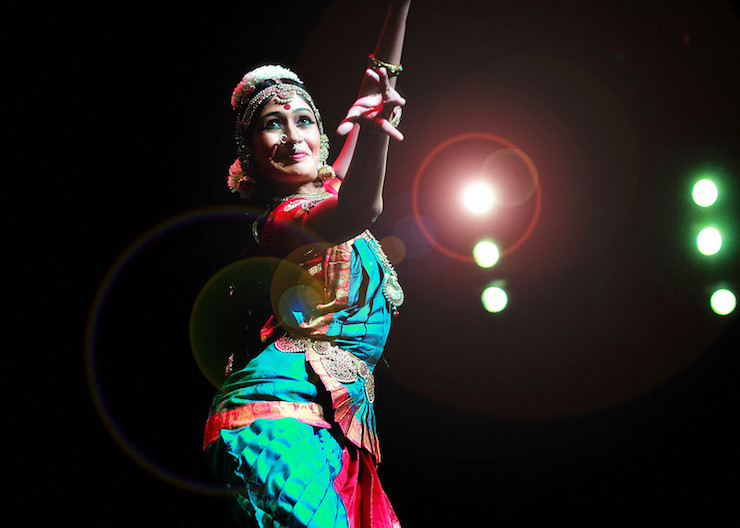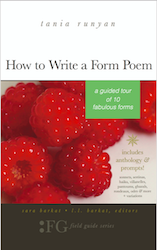Poet-a-Day: Meet Dheepa Maturi
I first learned about Dheepa Maturi through Tweetspeak Poetry, where she has shared personal writing that explores subjects like place, motherhood, and poetry with gorgeous honesty. Then when L.L. Barkat shared this ghazal with me, I knew I had to have it. Since then, I’ve enjoyed getting to know Maturi (over email, of course) and her poetry. Her origin story about “The Ancient Dance: A Ghazal” is one of my favorites. I’m sharing the first two couplets below.
If you’re interested in reading the rest of this stunning ghazal (and I know you will be), you’ll find it in How to Write a Form Poem!
The Ancient Dance: A Ghazal (excerpt)
I.
I received birth, grasped this world, and knew deeply that it is not enough to view dance,
So I begged, teach me the eons past, I will receive that, too. Let me speak through dance.
II.
Kings, sages, mendicants, and, yes, yes, goddesses, all told with my body, mouth, hands,
I wait behind velvet, drawn in drunk by the chords and patterns and beats that cue dance…
—Dheepa Maturi
Maturi shares her personal experience with writing her first ghazal below:
Tania Runyan (TR): Tell me a little about the origin story of “The Ancient Dance: A Ghazal.”
Dheepa Maturi (DM): During a graduate school interview, a dean asked whether I’d done anything unusual during the preceding summer. I shared that I’d trained for and presented a two-hour solo performance of Bharath Natyam, an Indian classical dance. I’ll never forget his response, delivered with a frown: “Isn’t that just dancing for men?”
As the daughter of an immigrant family in the U.S., the chasm between the dean’s perceptions and my own reality was a familiar one. Nevertheless, I sat stunned for a moment, thinking of my years spent mastering intricate footwork, cultivating balance and grace, and learning to convey an extensive array of emotions and expressions. I thought of how honored and privileged I felt to have become a steward of thousand-year-old legends and philosophies. Gathering my wits and my voice, I explained the ancient storytelling tradition of Bharath Natyam, as well as the athleticism, skill, and training it required. I described the sophistication of the concepts, and the layers of meaning, conveyed via this form of dance—for example, the eternal cycles of creation and destruction, and the soul’s longing to merge with the divine.
More than my words, I remember how desperately I wanted to make the dean understand. I think “The Ancient Dance” had been incubating within me since the day of that interview, and writing it helped me to resolve that interaction in my own heart. It also allowed me to embrace a lesson I’d learned during the intervening years—that my work is not to convince. Rather, my work is to share, freely and courageously, what I know and how I see.
TR: Why did you decide to write the poem as a ghazal? Or did you start out wanting to write a ghazal, and the poem grew out of the form?
DM: I’d always written free verse. Then, about four years ago, an editor suggested that I also engage with form poetry, directing me to the Tweetspeak Poetry website to explore the options and instructions. As I read through the list, the word ghazal immediately caught my attention, due to my Indian origin. Though I was familiar with the ghazal tradition, somehow I hadn’t considered the ghazal as a type of form poetry. I was incredibly intrigued.
As I studied the rules of the ghazal, three words dropped into my head: “cue,” “view,” and “true,” as well as the image of a costumed dancer of Bharath Natyam, the classical Indian dance that I’d learned and performed throughout my life. Then, a similarity struck me. Like a ghazal, Bharath Natyam is also strict in form, providing a dynamic structure from which to relate stories and communicate deep emotion. And I loved the idea of writing a form poem about a “form dance,” so to speak.
From a technical point of view, the ghazal form challenged me, requiring me, for example, to rhyme the second-to-last words in various lines and to conclude each stanza with the same word. From an emotional point of view, the ghazal convention of calling to oneself made me feel strangely vulnerable, as though I was becoming too visible, or demanding too much. As I moved through my reluctance, that call eventually felt befitting to the poem.
TR: What do you hope poets can learn from a book like How to Write a Form Poem?
DM: Regardless of type, poetry is a (you knew it was coming!) dance, of art and craft. Obviously, form poetry demands scrupulous attention to craft and the physical construction of a poem, and I feel this attention sharpens my writing skills. Particularly as a free verse poet, I believe that attempting form poetry opens new creative pathways for me and inspires me to experiment. The very act of building the form seems to free my mind to play unconsciously with still-nebulous ideas and concepts—and I am invariably surprised by what emerges.
About Dheepa Maturi
Dheepa R. Maturi, an Indian-American poet and writer, enjoys exploring the rich and surprising ways in which cultures interact over time. A graduate of the University of Michigan and the University of Chicago, her poetry, essays, and fiction have appeared in a variety of literary journals and anthologies, including Literary Hub, PANK, The Fourth River, Tiferet, Every Day Poems, Tweetspeak Poetry, Jaggery, Crosswinds, The Indianapolis Review, and elsewhere.
Hear Dheepa Read “The Ancient Dance: A Ghazal”
go to 1:00:47 to hear Dheepa read
Photo by Pabak Sarkar, Creative Commons, via Flickr. Post by Tania Runyan.
Browse more Poet-a-Day
Browse 50 States of Generosity
Check out The Yellow Wall-paper Graphic Novel
BUY ‘HOW TO WRITE A FORM POEM’ NOW!
- Flowers of California: California Poppy - December 8, 2022
- Flowers of California: Lily of the Nile - October 13, 2022
- Flowers of California: Crape Myrtle - October 5, 2022



L.L. Barkat says
Dheepa, I loved this. You have reminded me again of the dangers of a lack of curiosity (and moving straight to judgement). How much richness we miss when we assume we know the lives of others! Too bad the professor didn’t ask to hear more about why and how and where you dance, rather than assume he understood it all. Too bad for any of us, when we do the same with those we meet, in a number of circumstances.
Your poem is so beautiful. It’s one of my favorite ghazals. 🙂
Dheepa Maturi says
You made my day, L.L.! Thank you for your lovely and kind words. And thank you also for creating this uplifting and inspiring corner of the poetic universe, where hope and joy bloom and thrive. I feel so very fortunate to participate in such a beautiful endeavor — and one that illuminates the “lives of others,” as you put it!
Bethany Rohde says
“It also allowed me to embrace a lesson I’d learned during the intervening years—that my work is not to convince. Rather, my work is to share, freely and courageously, what I know and how I see.”
What a freeing idea.
Thank you for sharing all of this with us.
Dheepa Maturi says
Bethany, thank you so much for reading the interview and responding! I heartily agree that releasing that single objective — convincing — was tremendously freeing. Before that, I’d always felt I was shouting “please hear me!” — but a wall separated me and my words from everyone else. That single shift in thought brought the wall down.
Laurie Klein says
“… teach me the eons past . . . I wait behind velvet . . .”
Dheepa, the lines Tania shares with us here expand time and drench the senses and imagination.
This struck me, too: “… calling to oneself made me feel strangely vulnerable, as though I was becoming too visible, or demanding too much.”
I picture myself at the page as in a darkened theater, applauding your movement through that reluctance, Dheepa—oh, how exquisitely scary . . . and on its way to compelling this reader via example, thus, invitation. Thank you!
Dheepa Maturi says
Laurie, how kind you are! Thank you so much for sharing what words and ideas lingered for you — this feels like such an honor, from a person who weaves words as deliciously and exquisitely as you do. I love the image of you in the theater, my friend, offering your strength and support for my growth and healing. I am grateful!
Sandra Heska King says
I enjoyed going back to read your earlier post again. I’d forgotten this dance was a 2-hour performance! I read the whole poem, and the line “I understand why so few dance” is an ouchy. What a shame when rain falls on our creative joy. Thanks for this poem, this post, your other post, your wisdom, and your joy. It’s contagious.
Dheepa Maturi says
Sandra, thank you so much for reading the interview and for your kind response. It is a constant surprise to me how the act of writing extracts splinters of all sorts and allows healing — even after decades. How wonderful that our creative joy, as you beautifully phrased it, can reemerge from that rain!
Kaki Garard says
Dheepa, I so appreciate your continued effort to provide our world the beauty of your perspective. I especially enjoy reading it through Twitter – Tweetspeak, what a clever way to share and inspire creativity… as I thumb through my work obligations. TY!
Dheepa Maturi says
Kaki, thank you from the bottom of my heart. Your reading and responding are such gifts, and I want you to know that I am so grateful!